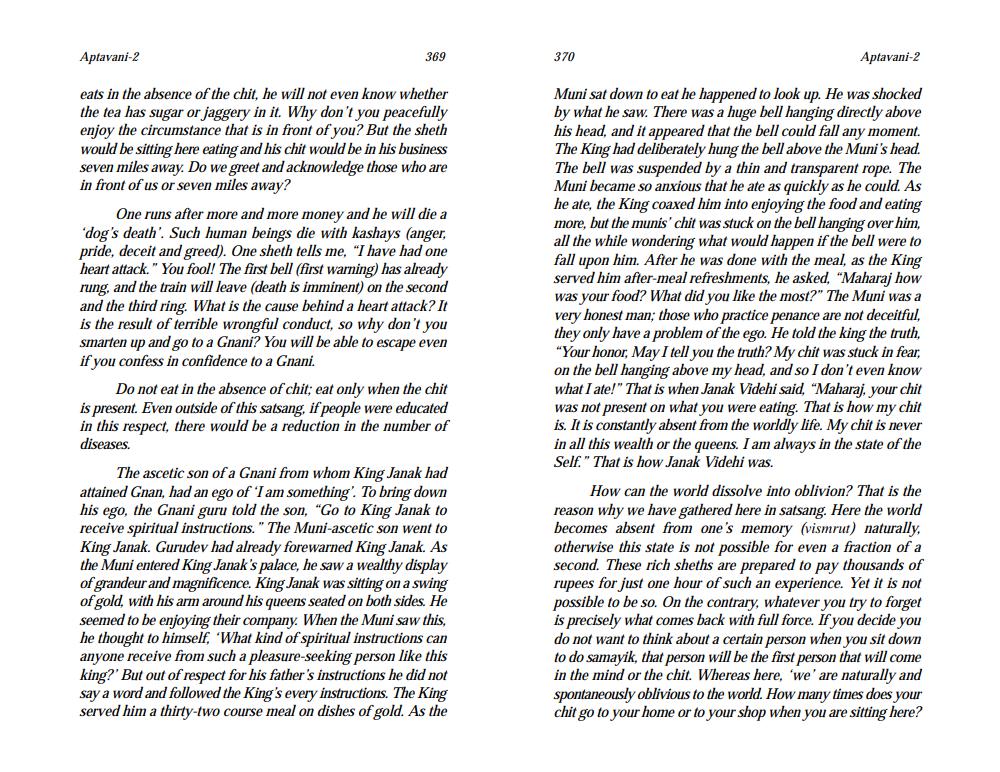________________
Aptavani-2
369
370
Aptavani-2
eats in the absence of the chit, he will not even know whether the tea has sugar or jaggery in it. Why don't you peacefully enjoy the circumstance that is in front of you? But the sheth would be sitting here eating and his chit would be in his business seven miles away. Do we greet and acknowledge those who are in front of us or seven miles away?
One runs after more and more money and he will die a 'dog's death'. Such human beings die with kashays (anger, pride, deceit and greed). One sheth tells me, "I have had one heart attack." You fool! The first bell (first warning) has already rung, and the train will leave (death is imminent) on the second and the third ring. What is the cause behind a heart attack? It is the result of terrible wrongful conduct, so why don't you smarten up and go to a Gnani? You will be able to escape even if you confess in confidence to a Gnani.
Do not eat in the absence of chit: eat only when the chit is present. Even outside of this satsang, if people were educated in this respect, there would be a reduction in the number of diseases.
The ascetic son of a Gnani from whom King Janak had attained Gnan, had an ego of 'I am something'. To bring down his ego, the Gnani guru told the son, "Go to King Janak to receive spiritual instructions." The Muni-ascetic son went to King Janak. Gurudev had already forewarned King Janak. As the Muni entered King Janak's palace, he saw a wealthy display of grandeur and magnificence. King Janak was sitting on a swing of gold, with his arm around his queens seated on both sides. He seemed to be enjoying their company. When the Muni saw this, he thought to himself, 'What kind of spiritual instructions can anyone receive from such a pleasure-seeking person like this king?' But out of respect for his father's instructions he did not say a word and followed the King's every instructions. The King served him a thirty-two course meal on dishes of gold. As the
Muni sat down to eat he happened to look up. He was shocked by what he saw. There was a huge bell hanging directly above his head, and it appeared that the bell could fall any moment. The King had deliberately hung the bell above the Muni's head. The bell was suspended by a thin and transparent rope. The Muni became so anxious that he ate as quickly as he could. As he ate, the King coaxed him into enjoying the food and eating more, but the munis' chit was stuck on the bell hanging over him, all the while wondering what would happen if the bell were to fall upon him. After he was done with the meal, as the King served him after-meal refreshments, he asked, "Maharaj how was your food? What did you like the most?" The Muni was a very honest man; those who practice penance are not deceitful, they only have a problem of the ego. He told the king the truth, "Your honor, May I tell you the truth? My chit was stuck in fear, on the bell hanging above my head, and so I don't even know what I ate!" That is when Janak Videhi said, "Maharaj, your chit was not present on what you were eating. That is how my chit is. It is constantly absent from the worldly life. My chit is never in all this wealth or the queens. I am always in the state of the Self." That is how Janak Videhi was.
How can the world dissolve into oblivion? That is the reason why we have gathered here in satsang. Here the world becomes absent from one's memory (vismrut) naturally, otherwise this state is not possible for even a fraction of a second. These rich sheths are prepared to pay thousands of rupees for just one hour of such an experience. Yet it is not possible to be so. On the contrary, whatever you try to forget is precisely what comes back with full force. If you decide you do not want to think about a certain person when you sit down to do samayik, that person will be the first person that will come in the mind or the chit. Whereas here, 'we' are naturally and spontaneously oblivious to the world. How many times does your chit go to your home or to your shop when you are sitting here?




